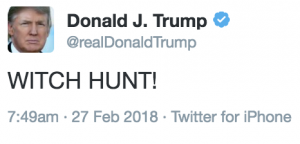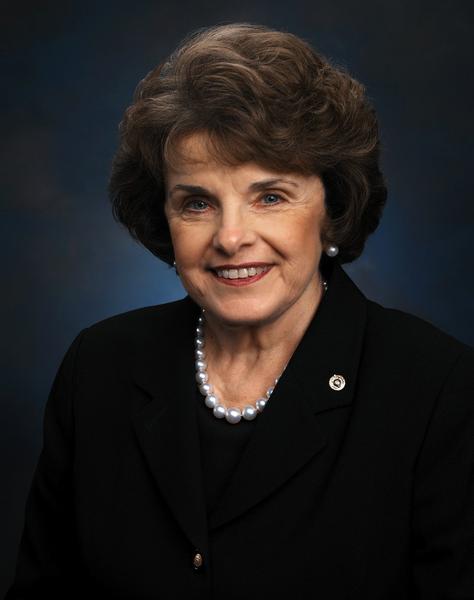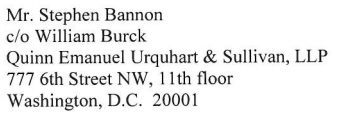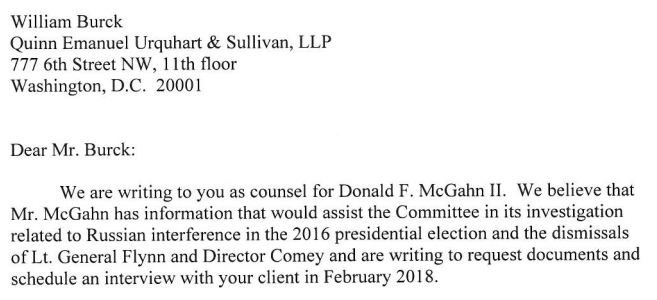There’s something funny about the story — first broken by NYT tonight, then confirmed by WaPo — that Trump wanted to fire Robert Mueller last June but backed off after White House Counsel Don McGahn threatened to quit.
Oh sure, the NYT version has all the trappings of the classic principled stand. McGahn threatened to quit which led Trump to back down.
After receiving the president’s order to fire Mr. Mueller, the White House counsel, Donald F. McGahn II, refused to ask the Justice Department to dismiss the special counsel, saying he would quit instead, the people said.
But the WaPo lays out something that’s only hinted at in the NYT version: McGahn never told Trump himself he was going to quit.
McGahn did not deliver his resignation threat directly to Trump, but was serious about his threat to leave, according to a person familiar with the episode.
[snip]
Trump decided to assert that Mueller had unacceptable conflicts of interest and moved to remove him from his position, according to the people familiar with internal conversations.
In response, McGahn said he would not be at the White House if Trump went through with the move, according to a senior administration official.
Described that way, it sounds more like McGahn wasn’t going to take yet another action that exposed him, personally, to obstruction charges. After all, McGahn had already nudged close to that line on several occasions, though it’s not something foregrounded in either of these stories.
While the NYT admits that McGahn was just months off of trying to persuade Jeff Sessions to ignore DOJ ethics advice and not recuse, it doesn’t mention that McGahn helped orchestrate getting Jeff Sessions and Rod Rosenstein to provide cover for a Jim Comey firing that he knew, because he had insisted Trump rewrite his firing letter, was ultimately an effort to end the Russian investigation.
The other funny thing about both these stories is how they obscure one of the known sources of tension that led to John Dowd replacing Marc Kasowitz. Both stories describe Kasowitz’ efforts to discredit Mueller to make claims of partisanship — an effort that continues today, albeit largely though not entirely outsourced to the more venal Republican members of the House.
Around the time Mr. Trump wanted to fire Mr. Mueller, the president’s legal team, led then by his longtime personal lawyer in New York, Marc E. Kasowitz, was taking an adversarial approach to the Russia investigation. The president’s lawyers were digging into potential conflict-of-interest issues for Mr. Mueller and his team, according to current and former White House officials, and news media reports revealed that several of Mr. Mueller’s prosecutors had donated to Democrats.
But it doesn’t explain what Michael Wolff, at least, reports to be the precipitating cause of Kasowitz and Mark Corallo’s departure: their own concern that Trump’s July 7, 2017 lies about the June 9, 2016 meeting itself amounted to obstruction of justice.
An aggrieved, unyielding, and threatening president dominated the discussion, pushing into line his daughter and her husband, Hicks, and Raffel. Kasowitz—the lawyer whose specific job was to keep Trump at arm’s length from Russian-related matters—was kept on hold on the phone for an hour and then not put through. The president insisted that the meeting in Trump Tower was purely and simply about Russian adoption policy. That’s what was discussed, period. Period. Even though it was likely, if not certain, that the Times had the incriminating email chain—in fact, it was quite possible that Jared and Ivanka and the lawyers knew the Times had this email chain—the president ordered that no one should let on to the more problematic discussion about Hillary Clinton.
[snip]
In Washington, Kasowitz and the legal team’s spokesperson, Mark Corallo, weren’t informed of either the Times article or the plan for how to respond to it until Don Jr.’s initial statement went out just before the story broke that Saturday.
[snip]
Mark Corallo was instructed not to speak to the press, indeed not to even answer his phone. Later that week, Corallo, seeing no good outcome—and privately confiding that he believed the meeting on Air Force One represented a likely obstruction of justice—quit.
If this story is correct, then it wasn’t, just, the plan to attack Mueller that caused the break (and as I said, that plan has just been outsourced to people protected by Speech and Debate clause protections). Rather, it was also a subsequent incident of clear obstruction, one done in the wake of a meeting with Vladimir Putin.
Where was McGahn the principled attorney threatening to quit rather than permit obstruction to occur for that?
Several things may be contributing to the nonsensical parts of these stories. First, it may be that a number of these people are at some risk of obstruction charges themselves. To the extent they’re all trying to spin their activities in the best light (assisted, in McGahn’s case, because he shares a lawyer with Reince Priebus and Steve Bannon), they may have to blame others for their actions.
Add in the fact that some of this testimony might be surprising to others. While McGahn, with John Dowd and Ty Cobb, presumably has the most knowledge, it’s possible he didn’t know about Sessions’ testimony (and Sessions reportedly didn’t share details of his testimony with Trump).
So I don’t know what the truth is.
I do know, however, that threatening to quit but not telling Trump about it is a funny way of changing his behavior.
Update: The CNN confirmation of this emphasizes, like the WaPo does, that McGahn didn’t threaten to quit directly. It also quotes Anthony Scaramucci saying that the attempt to fire doesn’t matter because Trump backed off the decision — so it may be that’s how the leakers (all represented by the same lawyer, William Burck — spun this).
Also consider the possibility that NewsMax CEO Chris Ruddy, who is a Mike Schmidt source and who floated Trump’s plan to fire Mueller contemporaneously as a way of trying to get him to back down, is a key source for this. It may mean that Ruddy’s stance, far more than McGahn’s, is what led Trump to back down.
The Politico version of this emphasizes Ruddy’s June stance.
In mid-June, Chris Ruddy, a close Trump friend and Mar-a-Lago member, said after a visit to the White House that he’d overheard discussion about the president considering firing Mueller.
“It could trigger something well beyond anything they ever imagined,” he told POLITICO at the time. Later that day, Ruddy told PBS NewsHour anchor Judy Woodruff that Trump was “considering perhaps terminating the special counsel.”
Ruddy added during the interview he thought it would be “a very significant mistake” to oust Mueller. He noted Mueller had interviewed with Trump to succeed Comey as FBI director, though the president later went on to appoint former Justice Department official Chris Wray to the job.
Mueller should invite Ruddy in for a chat.
Politico also quotes an attorney representing someone else suggesting that it reflects an all-man-for-himself attitude among Trump’s associates.
“It’s one more brick in the wall,” said a Washington lawyer representing another senior Trump aide in the Russia probe who added that the most interesting aspect of the Trump-Mueller story to him was that “people are leaking this shit.”
“That is a sign to me people perceive this ship has sprung a leak and it’s time to make themselves look good,” the attorney said. “To some extent I think the fact of the leaking is almost the most significant, that we’ve reached an inflection point where people at the center of things feel the need to redeem themselves at the expense of the president.”
I do think the leaking of this is significant — and may have as much to do with news of Bannon or Sessions’ testimony as anything else — but given that at least two of the people involved here (McGahn and Reince Priebus) share a lawyer, it may only represent that particular lifeboat abandoning ship.
Update: The updated WaPo version of this makes it clear that Reince Priebus and Steven Bannon were both in the loop on this.
Trump’s ire at Mueller rose to such a level that then-White House strategist Stephen K. Bannon and then-Chief of Staff Reince Priebus grew “incredibly concerned” that he was going to fire Mueller and sought to enlist others to intervene with the president, according to a Trump adviser who requested anonymity to describe private conversations.
Both of the men were deeply worried about the possibility and discussed how to keep him from making such a move, this person said.
Priebus and Bannon did not immediately respond to requests for comment.
In one meeting with other advisers, Bannon raised the concern that if Trump fired Mueller it could trigger a challenge to his presidency based on the 25th Amendment, which lays out the process of who succeeds a president in case of incapacitation.
Despite internal objections, Trump decided to assert that Mueller had unacceptable conflicts of interest and moved to remove him from his position, according to the people familiar with the discussions.
In response, McGahn said he would not remain at the White House if Trump went through with the move, according to a senior administration official.
The president, in turn, backed off.
So it seems this leakapalooza stems in part from Burck, the lawyer representing them all.
Update: As this Politico piece (linked by PINC below) notes, McGahn hired Burck in the wake of obstructing justice in the Comey firing, way before Mueller came calling.
So it wasn’t that McGahn took a principled stand in June. It’s that his lawyer told him to stop obstructing justice.
Update: CBS tells what feels like the real story. First, as noted, McGahn’s threat didn’t really make it to Trump. Indeed, the firing wasn’t really even an order. The response was more of an eye roll. And, as predicted, the other people involved were fellow Burck clients Reince Priebus and Steve Bannon.
Two sources directly involved in the deliberations tell CBS News chief White House correspondent Major Garrett that McGahn’s threat was not communicated directly to Mr. Trump, but adjudicated by senior staff, principally then-chief of staff Reince Priebus and then-chief strategist Steve Bannon.
Garrett reports that while Mr. Trump talked about firing Mueller, he never issued a direct “order” to do so in any written form, although he did say he favored it in the presence of senior staff.
[snip]
White House senior staff viewed Mr. Trump’s talk of firing Mueller skeptically, as he frequently mentioned firing people in his administration, but often quickly forgets about it.
In the Mueller instance, as in other potential firing cases, senior staff acknowledged the president with nods, but did not take action, in hopes Mr. Trump would simmer down or forget, sources tell Garrett.
Because of this, discussion of firing Mueller was not acted upon or elevated from the White House to Department of Justice.
Moreover, McGahn’s threat went beyond the Mueller firing to his own compromised position.
McGahn threatened to resign over an accumulation of stresses and frustrations with the president, rather than leaving for issues related to Mueller’s potential firing.
McGahn’s primary stress was being a “no” voice for Mr. Trump.
Suddenly, this looks not so much like McGahn heroically defending the Constitution as McGahn trying to fix a shitty work situation.










